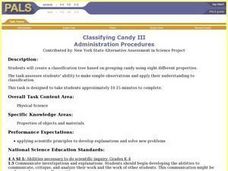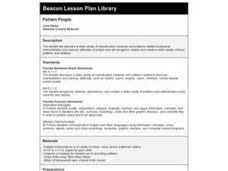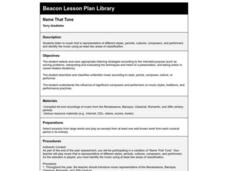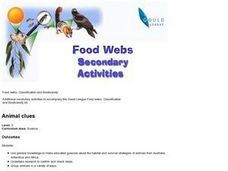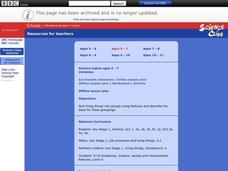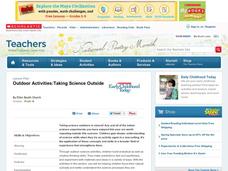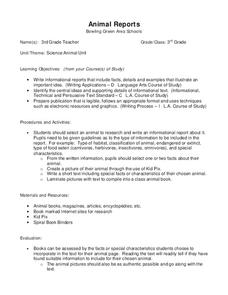Curated OER
Using Insects in the Classroom
Students identify and interpret the importance and diversity of the insect world. Students organize various insects into a classification system based on their characteristics. Students create tree or window ornaments utilizing their...
Curated OER
Creating a Dichotomous Key for Families of Idaho Butterflies
Students are shown how to use the butterfly section of the Digital Altals of Idaho. They discuss how to make a dichotomous key. Students use their skills of observation and recognize defining characteristics that distinguish different...
Curated OER
Identifying Trees Using Their Leaves in the Summer
Learners discover how to identify trees. In this research lesson students use dendrology to decipher what a trees classification is and explore each trees traits.
Curated OER
A Golden Age: Three West African Empires
Seventh graders research the kingdoms and rulers of Ghana, Mali and Songhay. In groups, they explore the trade routes and the spread of Islam. Using the internet, textbook and other sources, 7th graders collect information and write a...
Curated OER
Classifying Candy III
Young scholars create a classification tree based on grouping candy with eight different properties. This allows students to understand how living things are classified.
Curated OER
"Bug Hunt"
Fourth graders find bugs represented on a grid and then identify their name and physical characteristics that provide a picture of the bug using imagery.
Curated OER
Pattern People
Students describe a wide variety of classification schemes and patterns related to physical characteristics and sensory attributes of people. They recognize, extend and create a wide variety of those patterns and relations.
Curated OER
Animals Galore
Third graders use structural characteristics to sort and classify animals into groups.
Curated OER
Name That Tune
Fourth graders listen to different types of music, then categorize them into two different areas of classification.
Curated OER
Classifying Rocks
Students classify rocks into groups after they observe the rocks and identify properties that can be used to divide them into groups. They then identify other properties that could be used to classify other objects into groups.
Curated OER
Animal clues
Fifth graders use general knowledge to make educated guesses about the habitat and survival strategies of animals from Australia, Antarctica and Africa. They research to confirm and check ideas and group animals in a variety of ways.
Curated OER
What's In A Name?
Students create a binomial system of nomenclature for classifying organisms they encounter in a field trip to a natural history museum or from pictures in library books. They work in small groups to create accurate drawings and place...
Curated OER
Survival
Students identify characteristics of Australia, Africa and Antarctica and compare and contrast them to each other. They work together to identify adaptations that animals have used to survive. They also practice classifying animals.
Curated OER
Insect Book
Fifth graders select an insect and create a page for an Insect ABC book to display their research. They choose an insect from a given letter of the alphabet and use KidPix to illustrate. They write 2-3 sentences describing their insect...
Curated OER
Tree-Mendous!
Pupils classify trees. In this tree-mendous lesson, students categorize a variety of trees to assist them in playing a Jeopardy like game. Pupils identify new vocabulary terms and classify the uses and benefits of trees for humans.
Curated OER
Lords of the Night
Second graders explore bird classification, specifically owls. They dissect their own owl pellet and explain the predetor and prey relationship.
Curated OER
Sea Turtles
Students investigate eight different species of sea turtles while being involved in classroom lecture and video presentation. The characteristics used to identify sea turtles is taught to help students identify unknown species.
Curated OER
Supplies
Fifth graders determine what supplies they will take with them in order to survive their trip through the Amazon. The use estimation and basic math skills to determine how much they can carry and what they can use to survive in the Amazon.
Curated OER
Variation
Students practice sorting living things into groups using their characteristics. Using pictures of leaves and animals, they sort them based on their color and shape and write the objects characteristics under the picture. They share...
Curated OER
Outdoor Activities: Taking Science Outside
Students participate in various outdoor science activities to enhance their observation, classification, and analysis skills. In this outdoor lesson, students begin by observing a tree from a straightforward angle, then from the...
Pennsylvania Department of Education
Alike and Different
Students compare and contrast objects and are introduced to a Venn Diagram. In this alike and different lesson, students make observations regarding properties of objects. Students classify object and build ideas about variables....
Curated OER
Grouping and Changing Materials
Pupils feel and observe different types of materials. Using the internet, they sort objects based on the materials they are made from and justify their reasons for putting it in a certain category. They identify objects that could fit...
Curated OER
Animal Reports
Third graders choose an animal to research and write a report about. They determine the animals' habitat, animal classification, whether it is endangered or extinct, and the type of food it eats. Also, they add any special...
Curated OER
Alien Invaders: Native vs. Exotic Species
Seventh graders investigate the differences between native and non-native species. They answer different level questions using Bloom's Taxonomy. This is done creatively with the students playing a version of the game Jeopardy. Students...






